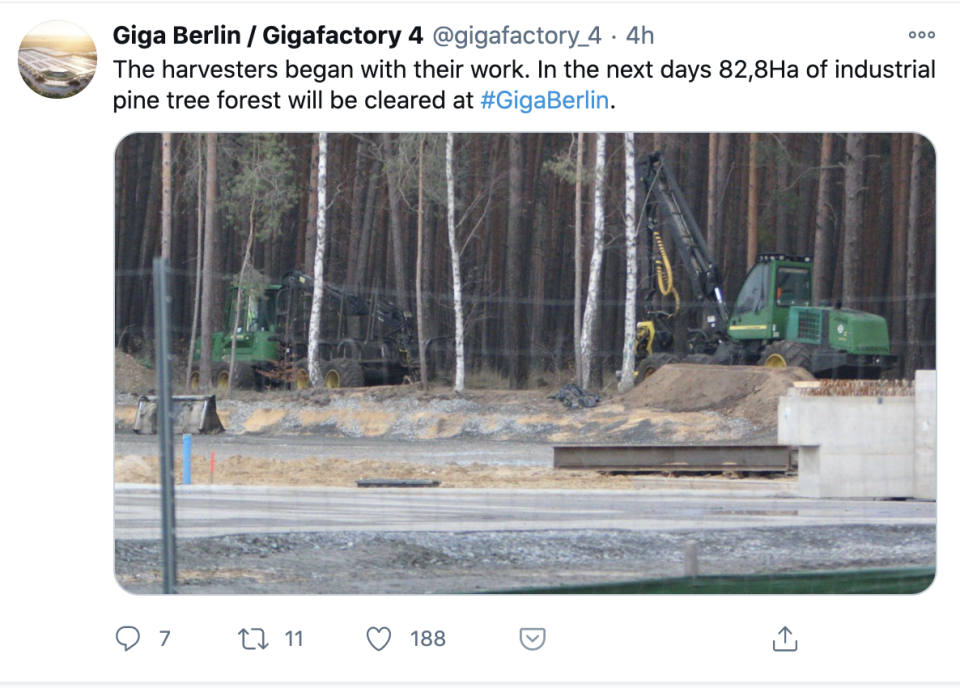Elon Musk in Berlin talks hostile takeovers, colonising Mars — and why people need to have more kids
Germany just can’t get enough of electric-car-and-space pioneer Elon Musk.
The country’s largest publisher Axel Springer, owner of the Bild tabloid, presented the Tesla (TSLA) chief executive with a special achievement award on Tuesday night, at a live-streamed Musk-themed ceremony, called “An Evening for Elon Musk — Mission to Mars.”
In a stage interview with Musk, Axel Springer chief executive Mathias Döpfner pointed out that Tesla’s market valuation was around $550bn (£411bn) now, compared to Volkswagen’s around €78bn (£70bn, $94bn). He asked Musk if it was a “serious option to buy out one of the big car companies.”
“Well, we’re definitely not going to launch a hostile takeover,” Musk said. “I suppose if somebody said ‘I think it would be a good idea to merge with Tesla, we would have that conversation.”
Musk said that back in 2007 and 2008, when he was trying to convince companies about Tesla, people told him that “starting a car company is crazy, you’re going to lose all your money.” He said he also thought “there was about a 10% chance of success.”
In an interview that ranged across Musk’s opinions on when humanity will colonise Mars, to when we will have real self-driving cars, the entrepreneur said that artificial intelligence was one of the biggest risks to humanity, as was de-population.
“I think we need to watch out about population collapse, this is somewhat counterintuitive to most people, they think that there are maybe too many humans, but that’s just cos they live in a city,” Musk said.
“If you’re in an aircraft and you look down, if you dropped a cannonball, how often would you hit a person? Basically never. In fact, there’s stuff falling in from space all the time.”
“Low birth rates I think is a big risk, this is definitely where the civilisation ends with a whimper and not a bang... It would be a sad ending where the average age becomes very high and the youth are de facto enslaved to take care of the old people — this is not a good way to end.”
The Tesla boss predicts that 10 years from now almost all cars will be fully autonomous — meaning Level 5 autonomy, where the driver can be completely hands-off the whole time.
“I’m extremely confident of achieving full autonomy and releasing it to Tesla customer base next year,” Musk said. “There’s an uncertain period of time on how long regulatory approval will take; I think if you are able to accumulate volumes of kilometres of autonomous driving, then it’s difficult to argue with, and look at the accident rate when the car is autonomous versus non-autonomous.”
READ MORE: Elon Musk plans ‘world’s biggest battery factory’ at Tesla plant near Berlin
On the topic of space, Musk said he was “fairly confident” people would land on Mars about six years from now, and an un-crewed vehicle would land within two years. “I’m optimistic about the future on earth but it’s important to have life insurance for life as a whole.”
“It’s not exactly a plan B...we want to have a future that is inspiring,” he said. “A future where we are a space-faring civilisation out there among the stars.. I think that every kid gets excited about that, you don’t even need to teach them, it’s instinctive.”
Musk said last week that he was planning to build the world’s largest battery factory on the same site as his Gigafactory car plant, currently under construction in the state of Brandenburg, just outside Berlin.
Speaking at the European Battery Conference in November, he said cell production in Brandenburg would begin with a capacity of around 100 gigawatt hours a year, and eventually ramp up to 200 or 250 gigawatt hours a year.
“I’m pretty confident at that point it would be the largest battery-cell plant in the world,” Musk said.
The construction of the Tesla car plant in Grünheide has been going full-tilt ahead since early this year, thanks to provisional building approval licenses — they are still waiting for the final building permit.
On Tuesday (1 December), diggers started clearing another 82.8 hectares of forest. This will be needed in order to provide space for “pipelines and storage that are required for further construction progress," Brandenburg’s environment ministry told Handelsblatt business daily.
It said that Tesla had wanted to clear a larger area of the woods originally, but this has been "reduced several times to the … areas that are absolutely necessary at the present time."

The head of the Brandenburg Nature Protection Association (NaBu) told Handelsblatt that the association would "lodge an objection during the course of the day and demand immediate inspection of the files in order to check to what extent this decision actually takes into account all nature conservation requirements.”
The new German Tesla plant has attracted a lot of attention. On one side, German politicians are proud that Musk chose Germany for his first European car plant and delighted at the around 10,000 jobs it will bring.
On the opposite side, locals have been regularly protesting over what they fear will be environmental and wildlife damage, and high local-water usage from the enormous factory.
WATCH: Elon Musk and Bill Gates Tied for Title of World’s Second Richest Man

 Yahoo Movies
Yahoo Movies 
